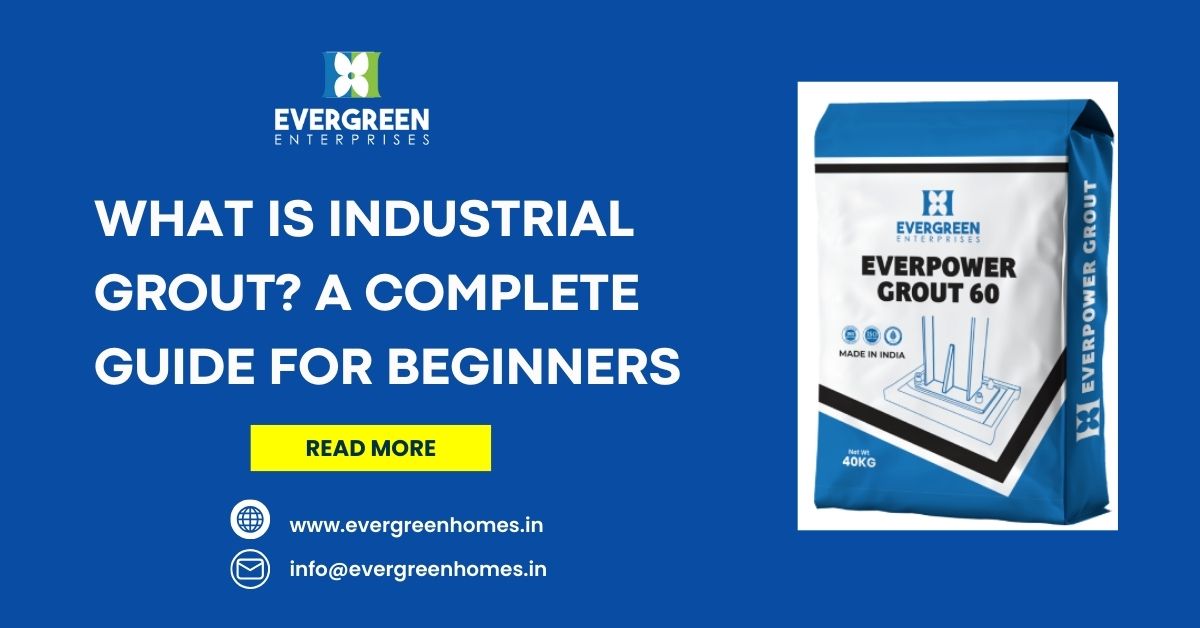The Ultimate Guide to Tile Grout: Choosing the Right One for Your Project

When it comes to tiling, it’s not just about having the perfect tiles — the right tile grout plays a crucial role in achieving a polished, long-lasting finish. But what exactly is tile grout, and how do you select the best one for your specific tiling needs?
Whether you’re a homeowner, interior designer, or contractor, this guide will walk you through everything you need to know about tile grout — from its types and importance to how to choose the ideal one for your project. By the end, you’ll have the confidence to make a well-informed decision backed by expert insights from Evergreen Enterprises, a trusted tile grout manufacturer and supplier in Pune.
What is tile grout?
It is a material used to fill the gaps between tiles, securing them in place while protecting against moisture, dirt, and damage. It adds durability, enhances aesthetics, and is essential for a professional finish. Grout is typically a mix of cement, sand, and water, but advanced types may include epoxy resins or polymers for improved performance.
With a wide array of color choices available, grout can either blend with the tile or provide contrast for a bolder design. Choosing the right grout not only strengthens the tile layout but can also become a key visual element in your space.
Why Is Tile Grout Important?
While it might seem like a small detail, tile grout performs several essential functions:
- Prevents Tile Movement: Grout holds tiles in place and minimizes cracking from foot traffic or shifting.
- Seals and Protects: Properly applied grout prevents water from seeping beneath tiles, avoiding mold and adhesive damage.
- Enhances Aesthetic Appeal: Available in various colors to match or contrast with tiles, grout helps define the visual character of a room.
- Improves Hygiene: Grouted joints stop dirt and bacteria from collecting in tile gaps, making cleaning easier.
- Boosts Longevity: A strong grout application protects tiles from wear and tear, increasing their lifespan.
- Provides Structural Support: Grout distributes stress across the tiled surface, maintaining integrity.
- Safety and Slip Resistance: Especially in wet areas, grout keeps tiles fixed and reduces the risk of slipping.
- Reduces Maintenance Costs: Quality grout reduces the need for frequent repairs, saving money in the long run.
- Handles Temperature Changes: In areas with fluctuating temperatures, grout absorbs expansion and contraction to prevent cracks.
Types of Tile Grout
As a leading tile grout manufacturer and supplier in Pune, Evergreen Enterprises offers a variety of grout types, each suited to specific applications:
1. Cement-Based Grout
- Sanded Grout: Ideal for joints wider than 1/8 inch; strong but needs sealing.
- Unsanded Grout: Smooth finish for narrow joints; perfect for walls and delicate surfaces.
Best for:
Kitchen backsplashes, bathroom walls, residential floors (low-to-moderate traffic).
2. Epoxy Grout
- Made with epoxy resins and filler powder.
- Highly resistant to stains, moisture, and chemicals.
- Does not require sealing.
Pros: Durable, waterproof, and stain-resistant.
Cons: Expensive and tricky to apply.
Best for:
Commercial kitchens, bathrooms, outdoor tiles, and high-moisture zones.
3. Furan Grout
- Industrial-strength, made with furfuryl alcohol.
- Resistant to harsh chemicals and high temperatures.
Best for:
Laboratories, chemical plants, heavy-duty flooring, and industrial kitchens.
4. Polymer-Modified Cement Grout
- Enhanced flexibility and adhesion.
- More resistant to moisture and temperature fluctuations.
Best for:
Outdoor spaces, commercial settings, high-traffic areas.
How to Choose the Right Tile Grout
1. Consider the Tile Type
- Porcelain/Ceramic: Cement or epoxy grout.
- Glass Tiles: Use unsanded grout to avoid scratching.
- Natural Stone: Prefer unsanded or epoxy grout to prevent staining.
2. Determine Grout Joint Width
- < 1/8 inch: Use unsanded grout.
- > 1/8 inch: Go with sanded grout.
3. Assess Moisture Exposure
- High-moisture areas (like bathrooms or balconies): Choose epoxy grout.
- Dry areas: Cement-based grout (seal it for protection).
4. Choose the Right Color
- Matching color: Seamless appearance.
- Contrasting color: Bold and defined tile lines.
- Neutral color: Versatile and hides dirt effectively.
5. Consider Maintenance
- Cement grout needs regular sealing.
- Epoxy grout is low-maintenance but requires careful application.
- Furan grout is heavy-duty but must be installed by professionals.
6. Think About Installation Ease
- Cement-based grout: Beginner-friendly and ideal for DIY projects.
- Epoxy and furan grouts: Best handled by experienced professionals.
Why Choose Evergreen Enterprises for Your Grout Needs?
As one of the top tile grout manufacturers and suppliers in Pune, Evergreen Enterprises is committed to delivering premium-quality grout products that meet both residential and commercial needs. Whether you’re renovating your kitchen or working on a large-scale industrial project, our range of cement-based, epoxy, and polymer-modified grouts ensures long-lasting performance and stunning finishes.
With years of expertise and a focus on durability and design, Evergreen Enterprises provides the right grout solutions to enhance every tiling project.
Conclusion
Tile grout is more than just a filler — it’s a critical component that affects durability, design, and maintenance. By understanding the different types of grout and their applications, you can make the right choice for your space.
From classic cement-based grout to advanced epoxy and furan options, and with expert guidance from Evergreen Enterprises, you can be assured of a finish that’s not only functional but also visually striking.
Choose wisely, grout confidently, and enjoy your tiles for years to come.


